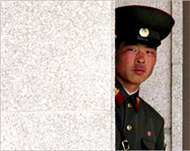North Korea talks battle to find unity
Envoys taking part in tortuous six-party talks on the North Korea nuclear crisis broke for the day, as delegates reported that while the basic issues were unresolved, differences had been narrowed.

“Basic differences in views among the parties concerned remain,” one Japanese delegate told reporters in Beijing as the delegates ended talks on Saturday.
“I believe our country and other countries as well want to narrow the differences and produce substantive results in the process of drafting.”
The fifth day of the current negotiating round began with China presenting a proposed draft document for discussion in the forum, which also involves the two Koreas, the United States, Russia and Japan.
Two sides entrenched
The main protagonists, the Americans and the North Koreans, appeared as entrenched as ever, diplomats said. Pyongyang is sticking to its demands for security guarantees and aid in return for abandoning its nuclear weapons development, while Washington insists the atomic programmes be dismantled first.
 |
|
North Korea demands aid before |
The North is also demanding Washington remove nuclear weapons from the peninsula. The United States, which keeps 30,000 troops in South Korea, says it no longer has such weapons there.
The North had even rejected a South Korean offer of energy aid in exchange for scrapping the programmes, the JoongAng daily said, citing an official in Seoul. North Korea wanted the energy aid but it wanted light-water nuclear reactors too, it said.
There was no official confirmation of the report.
Basis for discussion
Still, this first round of six-way talks in more than a year has seen an unprecedented level of bilateral contact between the US and North Korean sides. They have met six times this week after sticking to scripted position statements in earlier rounds.
 |
|
The contact between the US and |
One participant said he felt Washington and Pyongyang had deepened their understanding of each other’s positions after the hours and days of bilateral discussions.
“Of course, we cannot reach an agreement immediately,” the Japanese delegate said after Saturday’s session. “But the draft paper presented by China will serve as a basis for discussion.
“It is important for us to secure commitments from North Korea to dismantling its nuclear weapons and nuclear weapons programmes.”
Joint document
US chief negotiator Christopher Hill said before Saturday’s resumption: “Seriously, we will have a lot of discussion about text to see if we can come to some agreement among the six.
“But I want to let you know, it’s going to take a while. This is not going to be finished today or even tomorrow because even though the text will be rather brief [it will be] rather
important too.”
“It is not impossible to finalise the joint document on Monday,” said one diplomatic source close to the talks. “But it may take longer.”
Japan’s Yomiuri Shimbun said the joint statement would stop short of laying down a plan of action for Pyongyang to scrap its weapons, or of saying how it is to be rewarded if it does do so.
Improved relations
The leading daily, citing sources close to the negotiations, said the document would include only the points the various parties hold in common along with basic principles. It would not say how targets are to be achieved.
|
“Basic differences in views among the parties concerned remain” Japanese delegate |
The talks have come a long way from the early days of the administration of George Bush, when the president labelled North Korea part of an “axis of evil” alongside Iran and pre-war Iraq, or even from early this year when his secretary of state
called Pyongyang an “outpost of tyranny”.
Unlike the three previous rounds of six-way nuclear talks going back to August 2003, this time the discussions have remained open-ended.
The latest crisis erupted in October 2002 when US officials accused Pyongyang of pursuing a clandestine weapons programme, prompting it to expel UN nuclear inspectors. North Korea announced last February that it was now a nuclear power.
In Washington, US officials said negotiators at the Beijing talks had presented North Korea with what is said was clear evidence of a covert programme to produce highly enriched uranium (HEU). Pyongyang admits only to reprocessing plutonium.
Washington is demanding that Pyongyang dismantle all its nuclear activities, including the HEU programme.